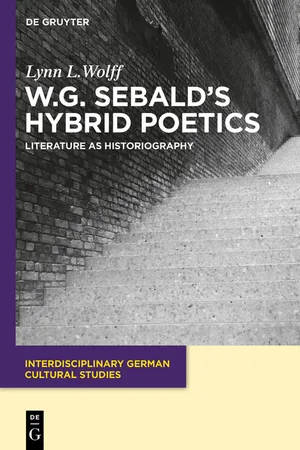The second part of this chapter takes a closer look at the way in which Sebald’s literary texts bring history and literature into dialogue with one another and the ethical dimensions of such a practice. The authenticity or feeling of authenticity in Sebald’s texts, that is, an authenticity based on emotional connection rather than rational reflection or factual reference, suggests that literature not only possesses a truth value in itself but can also be a means of accessing and transmitting historical truth. In considering the relationship between historiography and literary discourse from a diachronic perspective, this chapter responds to the question of the sustainability of traditional concepts and the emergence of new ones. Furthermore, I articulate this book’s central claim that Sebald’s œuvre forges a new discourse of literary historiography, a new type of historiography that comes into being only in the literary mode and that reveals literature’s privileged position for exploring, preserving, and understanding the past. Through this analysis of Sebald’s fiction I show how literature aims at and claims a certain kind of truth, as history does, and that this is a further reason this relationship can be seen as one of co-dependence, which has persisted over time, albeit in differing forms.
Literature versus Historiography across the Ages
Today it may seem like common theoretical knowledge that history, like literature, is a discourse that does not exist a priori. History, as opposed to literature, presents a particular challenge insofar as it can be understood to mean multiple things. In defining the concept, Reinhart Koselleck points to history as both an event and the recounting of this event, as well as the collection of examples, from which one can learn in order to live a just and wise life. Echoing Koselleck, Hayden White writes of “the diversity of meanings that the term history covers in current usage.” That is,
[history] applies to past events, to the record of those events, to the chain of events that make up a temporal process comprising the events of the past and present as well as those of the future, to systematically ordered accounts of the events attested by the record, to explanations of such systematically ordered accounts, and so forth.
This diversity of meanings makes it all the more difficult to formulate a consistent definition of the discourse of history, but this is not only a consideration of our current understanding of history or just a result of the “linguistic turn.” Rather, this challenge can be traced back to the beginnings of history. When
Herodotus, the “father of history,” wrote of historia (ιστορία), he used the word to signify knowledge in general as well as investigation and the result of research, i.e., the recording and reporting of knowledge. Thus we see how history, from its inception, has been defined both by the material sources (artifacts and documents) and by the documenter and documentation process (historian and historiography). Written history, based on material sources, in turn becomes a document or a form of documentation that serves as the basis for later histories.
Despite the multiplicity of referents bound to this one signifier, a “thread of distinction” between literature and history as formulated by Aristotle in his Poetics, still influences our current understanding of history. In chapter nine of his Poetics, Aristotle states,
The poet and the historian differ not by writing in verse or in prose. […] The true difference is that one relates what has happened, the other what may happen. Poetry, therefore, is a more philosophical and a higher thing than history: for poetry tends to express the universal, history the particular.
This fundamental distinction has indeed carried through from Herodotus to modern historiography. The idea of history that dominated from Herodotus’ time through the nineteenth century is that the “history” already exists, i.e., is inherent in the past events and experiences, and it is the task of the historian to tell this history. Here, the task of the historian can be seen as one of documentation, or even transcription and transmission from an occurrence to the account of this occurrence, that is, from “event” (Geschehen) to “history” (Geschichte), to use Karlheinz Stierle’s distinction. The innovation of Stierle’s model is the introduction of a third stage in this progression of writing history, namely the “text of history” (Text der Geschichte). Elizabeth Deeds Ermarth problematizes the way that both history and historical thinking, while an essential anthropological constant, have become naturalized. She describes how “[…] thinking historically is like breathing. It is automatic. It is ‘natural.’ We talk about ‘history’ as if it were something objective – Out There, like rocks and stones and trees: a natural medium in which all things exist, causalities unfold, and time is productive.” Ermarth formulates an urgent call to “develop alternative ways of using the past, and alternative explanations of how time passes and what it produces” and reiterates the importance of “preserv[ing] our relation to the past.” In the considerations that follow, I will develop just how literature presents a privileged mode of critically approaching and engaging with the past in order to preserve our relation to it. Several elements are at stake in the distinction between literature and history and will be discussed throughout this book, namely questions of reality, possibility, truth, experience, knowledge, representation, and imagination. Through my analyses of Sebald’s works, I illuminate the particular way in which literary discourse responds to and engages with these questions.
The development of a modern, totalizing concept of history can be located in the eighteenth century, and towards the end of this century, history achieves the status of a leading political and social concept. Fundamental to this modern concept of history is its status as a “Kollektivsingular” [collective singular], that is, the accumulation of individual histories. Reinhart Koselleck has tra...
